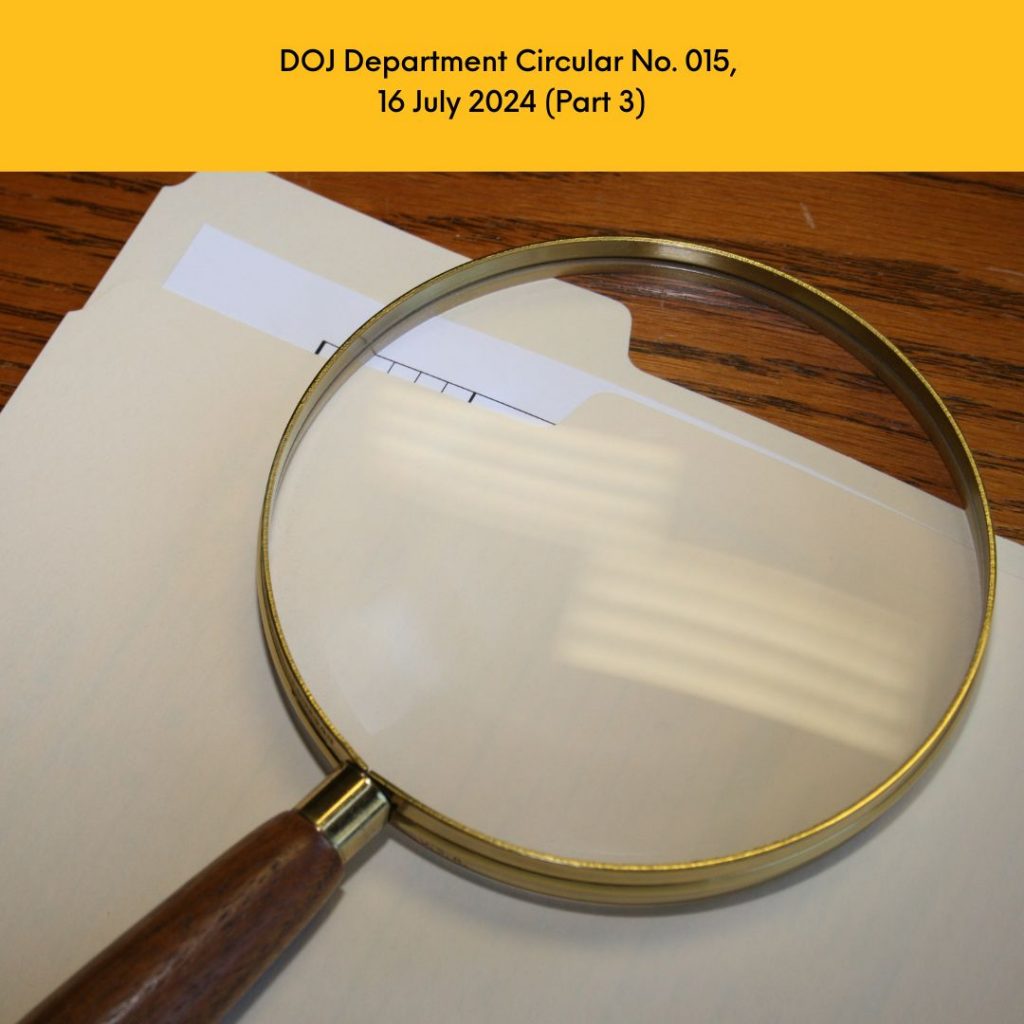
Published 9 December 2024, The Daily Tribune
This article focuses on Expedited Preliminary Investigation, a streamlined process designed for moderately severe cases, to ensure thorough, evidence-based investigations without excessive procedural delays.
To summarize, an Expedited Preliminary Investigation is used to determine if a person should be indicted in court, based on prima facie evidence that supports a conviction with reasonable certainty. If needed, this process may also involve a Case Build-Up (CBU) to gather further evidence.
An Expedited Preliminary Investigation applies to crimes or offenses with penalties ranging from one year and one day to six years, regardless of the fine. These cases generally fall within the jurisdiction of first-level courts, such as Metropolitan Trial Courts, Municipal Trial Courts, and Municipal Circuit Trial Courts. However, cases that are legally required to be tried in Regional Trial Courts follow the regular preliminary investigation or inquest process (Sec. 8).
PROCEDURE FOR EXPEDITED PRELIMINARY INVESTIGATION
- Initiating the Complaint-Affidavit
o Summary Investigation begins with the complainant filing a complaint-affidavit at the prosecution office, accompanied by:
• The original document, two duplicates for official records, and additional copies for each respondent involved in the case.
• A duly completed NPS Investigation Data Form (IDF).
• Specific details about the offense, including:
a. Names and addresses of the parties involved.
b. Date and place of the alleged crime or ordinance violation.
c. A factual statement outlining how the offense was committed.
o Affidavits from witnesses and supporting evidence are required to establish the prima facie case. (Sec. 9).
2. Evaluation by the Assisting Prosecutor
o Upon receiving the complaint-affidavit, the designated assisting prosecutor evaluates its sufficiency in form and completeness of evidence within three calendar days. The evaluation includes:
• Docketing and Assignment: If the complaint-affidavit is sufficient in form and supported by complete evidence, it will be docketed and assigned to an investigating prosecutor, who will resolve the case or, if necessary, issue a subpoena to conduct an expedited preliminary investigation.
• Case Build-Up (CBU): If the complaint-affidavit requires additional information or evidence, the assisting prosecutor will conduct a CBU, which must be completed within 20 calendar days. The CBU is initiated in cases where:
a. The complaint-affidavit is sufficient in form but lacks complete evidence.
b. The complaint-affidavit is either insufficient in form, incomplete in evidence, or both.
3. Docketing and Assignment Post-CBU
o After completing the CBU, if the complainant or law enforcement agency (LEA) submits the updated complaint-affidavit with all required evidence, the case will be docketed and assigned to an investigating prosecutor. The investigating prosecutor will then proceed to resolve the case or issue a subpoena if further expedited preliminary investigation is needed. If the complaint remains incomplete, the assisting prosecutor will close and terminate the case.
4. Issuing a Subpoena and Conducting the Investigation
o For cases requiring further investigation, the investigating prosecutor must issue a subpoena within five calendar days from receiving the case records. The subpoena will:
• Summon the parties to appear for a hearing within 15 calendar days of the investigating prosecutor’s receipt of the records.
• Include the complaint-affidavit and all attachments, directing the respondent to submit a counter-affidavit and/or affidavits from witnesses on the specified date.
5. Limitations on Affidavits and Clarificatory Hearings
o No reply-affidavit or rejoinder-affidavit will be accepted to streamline the process. However, if there are specific facts or issues requiring further clarification, the investigating prosecutor may conduct a clarificatory hearing within five calendar days following the submission of the counter-affidavit (Sec. 9).
When necessary, the procedures outlined in Department Circular No. 15 (DC 15) for virtual preliminary investigation may also be applied to Expedited Preliminary Investigations, allowing for flexible remote proceedings (Sec. 10).
To prevent delays, DC 28 establishes a strict timeline for resolving cases under Expedited Preliminary Investigation:
• Once all case records are received following CBU and docketing, the investigating prosecutor is required to resolve the case within 20 calendar days.
• After the investigating prosecutor’s resolution is prepared, it is then reviewed and acted upon by the Prosecutor General, City/Provincial Prosecutor, or their authorized representatives within five calendar days of receipt. (Sec. 13).
Unlike summary investigation, where motions for reconsideration are not permitted, an Expedited Preliminary Investigation allows the aggrieved party to file a motion for reconsideration, which must be filed within 10 calendar days from receipt of the resolution. (Sec. 14).
For more of Dean Nilo Divina’s legal tidbits, please visit www.divinalaw.com. For comments and questions, please send an email to cad@divinalaw.com.

